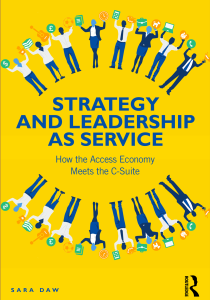By Sara Daw, below, Group CEO, The CFO Centre and The Liberti Group

So you have started your business to realise your dream of being your own master, doing meaningful work, collaborating with like-minded people, and essentially securing your future through having freedom of choice.
The first few years are a real mixture – exhilarating, chaotic, frantic, fun, and scary. Getting used to being your own boss, setting the direction, selling your vision to customers and then making it happen are challenging but worth it.
You invest your time and finances and your idea gains traction – you have a proven concept. As your business grows you start to bring on employees to join you. You start to feel more confident about being an entrepreneur – this new life is working and you are enjoying it.
Then usually one of two things happen. Demand for your product or service really takes off. You find yourself working all hours and making every decision. Everything involves you!
Or perhaps you hit a stumbling block. Your product needs changing, you need more funds to develop it, things stop working so well. You worry about paying all your bills. Yet again, you find yourself working all hours and making every decision. Everything involves you!
It is at this point when most entrepreneurs realise something has to give. Instead of feeling free, they feel trapped! They wish they had never started their business. It wasn’t meant to be like this. The reason they started out was to do all the things they are good at – developing new products, building customer relationships, innovation, not admin, compliance, and accounting. You are wearing far too many hats and some of the wrong ones too!
There must be a better way. And there is. This experience is normal and most small business owners go through it at one time or another. The key to change is first to step back, zoom out, and acknowledge what is happening. Then you need to identify the activities in the business that you, and only you, can do. These must be top priority and the first things you do every day.
After that you will be left with all the other things that need to be done, and this is where you need to delegate. These will include tasks that are trivial, tedious, time-consuming, teachable, and also those where you need an expert.
Given this context, the five most common roles that you should delegate are:
Finance strategy and operations including data analysis and reporting
The best way to do this is to bring in a fractional CFO to take responsibility and ownership of finance. These fractional leaders are an affordable solution for SMEs who don’t want, don’t need and can’t afford a full time CFO but recognise they need the skillset. They work flexibly from a day a month up to three or four days per week and will bring in the right accounting partners and help you hire the right finance team to give you the reassurance and confidence to build a robust finance strategy which aligns with your business. They will partner with you to manage risk, raise funds, tap into valuable industry and sector networks, and above all they will free you up to work ON your business.
Email management and administrative tasks – Take on an EA
An Executive Assistant (EA) should be one of your first hires, or if you don’t want to employ, you can engage with one on a freelance basis. They should be your ‘right hand’, a finisher who can action many of your requests, communicate on your behalf, organise your diary and most importantly act as a gate-keeper to your time. You can brief them on where you need to focus and they can make sure this happens.
Lead generation, social media and content creation
While business owners need to own and articulate their customer proposition, they should engage with specialists to create leads, generate content, and manage social media for brand awareness and lead generation. These are all specialist skills and time-consuming so hiring an individual if you think it is a full-time role or engaging a marketing agency will work well.
As these marketing activities accumulate, there will come a time where it would make sense to bring in a fractional CMO to manage this function holistically and align it to your business strategy.
IT support
You need to have secure, safe, and efficient systems to support all your business functions. Investing in a service to underpin your IT and help guide your strategy of systems and tools is something you need to leave to the experts.
Customer service
Taking on a customer service expert will ensure those vital yet high volume tasks of responding to queries, taking orders, and making sure your customers have a stellar experience will free up your time. This role could report into a fractional CMO which would free you up even more.
The C-suite Access Economy for SME growth
As the functions of Finance, Marketing, Tech, and People grow, the best way forward for SMEs is to delegate to fractional leaders, as mentioned above, who can own and lead the function. This is where Strategy and Leadership as Service comes in: the Access Economy for the C-suite.
This business model allows SME owners to tap into the talents and experience of high-calibre CXOs on a flexible basis. It provides SMEs with the valuable skillsets they need to grow without having to commit to a long-term employment contract. The outcomes can be game changing, as business owners can delegate with confidence and gain access to the right mindsets at the right time and in the right quantity to match the changing business agenda.
What’s more, by using the Access Economy to layer in these skills in several disciplines over time or even simultaneously, the SME gets accelerated benefit from these functions developing in tandem. A fractional CFO working alongside their part-time CMO, CIO, and CHRO means the marketing, technology, and talent strategies are properly funded, phased, and coordinated – reducing risk and increasing certainty in outcomes.
Ultimately, the act of delegation never ends. As we delegate, we pick up more activities to fill the gap, so this process needs to be revisited iteratively. Adopting the Strategy and Leadership as Service business model allows SME owners to access valuable CXO skills and delegate flexibly and with confidence, leading to less leader overwhelm and successful growth.
 Sara Daw is Group CEO of The CFO Centre and The Liberti Group, and the author of Strategy and Leadership as Service – How the Access Economy Meets the C-Suite, which explores the fractional leadership trend.
Sara Daw is Group CEO of The CFO Centre and The Liberti Group, and the author of Strategy and Leadership as Service – How the Access Economy Meets the C-Suite, which explores the fractional leadership trend.

